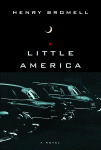|
|
 |
|
|
 |
|
|
 |
 |
 |

|
A suspense novel, a political thriller, a novel of discovery—Little America opens in Boston today and tells the story of a man in search of the truth about his father’s past, a past locked away in the C.I.A.’s code of silence.
Terry Hooper’s father—Quaker-raised, Yale-educated, a sometime poet, now a retired (is he?) State Department veteran—was, in the 1950s, the C.I.A. station chief in Kurash, a small, newly constituted Middle Eastern country, a country caught in the grip of cold war politics, a country of beautiful and frightening Otherness (Arab women hidden behind their veils, scar-faced men on horseback with curved sabers, and streets that melted in the heat), 90 percent Muslim, lodged like a walnut between Syria and Iraq. Mack Hooper’s assignment: to win the confidence of the King of Kurash, an enigmatic, British-educated desert aristocrat to whom no one, not even the U.S. Ambassador, had been able to get close.
In a narrative that moves backward and forward in time, Terry puts together the pieces of the puzzle that has haunted him. Is his father a good man? Was he a friend to the young King, or a diplomat-seducer sent to betray him?
What Terry unearths about the American intrigues in Kurash, about promises made, about monies delivered, about betrayal, about courage, about “us” and “them,” is brilliantly told in a novel that royally entertains while it evokes the conflict between private morality and public policy as it recaptures a time gone by, a time when Americans set out armed with “good intentions,” youthful desire for adventure, and the belief that they could save the world.
|
|
 |
|
|
|

